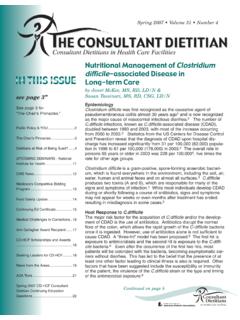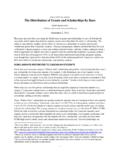Transcription of Public Official's Guide to Compliance with South …
1 Public Official s Guide to Compliance with South carolina s freedom of information ActCorrect as of May 2017 Table of ContentsIntroductions to the South carolina freedom of information Act .. pages 2-4Th e law s text and its interpretation .. pages 5-20 Statute on commercial solicitation .. page 21A Public offi cial s liability in releasing Public records .. page 22 How to respond to an FOIA request .. page 22 Flowchart for amending agendas .. page 23 FOIA index by subject .. page 24 Public Official s Guide to Compliance with South carolina sFreedom of information ActTh is booklet includes the full text and a plain-language Guide to applications of the freedom of information Act concerning Public meetings and Public records in South carolina . It is designed as an easy-to-use Guide for both Public offi cials and copies of this booklet are available from the South carolina Press Association.
2 Please call SCPA at (803) 750-9561 or email to request copies. Th e cost is $4 each, which includes shipping and handling. Bulk discounts are available. Th is Guide can also be downloaded for free as a PDF at ,Recently, I was pleased to sign into law a bill that modernizes and improves our state s freedom of information Act (FOIA). Th is updated FOIA Guide will serve as a wonderful resource for Public offi cials in South e new law will allow state and local government agencies to become more responsive and reliable in providing easier and less costly access to Public information and documents. I would like to thank the South carolina Press Association for its hard work on making this FOIA reform a reality. As Public servants we should always endeavor to maintain the Public s trust and confi dence in their government. In that spirit, I hope you will remember When in doubt disclose.
3 Yours very truly,Henry McMasterGovernorAn Introduction to the South carolina freedom of information ActTh ere should be no need for the state to have a freedom of information Act. Clearly, our founding fathers knew that a government operating behind closed doors, unchecked by and unaccountable to its citizenry, is not a government of, by and for the people. Rather, it is a government of, by and for time and again, evidence tells us our forefathers intentions in framing the Constitution need shoring up with individual states Sunshine from human nature, there is a tendency among governments at all levels, when allowed to operate in the dark, to gravitate under a shroud of secrecy. As a result, and all too oft en, elected and appointed bodies begin to see themselves as more than what they are, more than what they were intended to be, creating a disconnect from the very people for whom they work and to whom they are state s freedom of information Act (or Sunshine Law) was born in 1976, appropriately it would seem, during our nation s bicentennial, and has since been revised and updated on several is a fl uid document that must continue to be updated and revised, especially with the changes wrought by this digital age when emails, texts, FaceTime and Skype can provide the means to skirt the law for those who want to do so deliberately.
4 Our digital era also reduces what was largely a paper fi ling system, making it far easier not only to locate Public documents, but also make them readily available, and transmittable. Finally, aft er a seven-year attempt, our state s FOIA laws were again revised as the Legislature gave its support to meaningful changes that were signed into law by Gov. Henry McMaster on May 19, e changes signed into law are substantial victories for the Public s access to how the government operates, what it is doing, and how and where it is spending taxpayer e amount of time Public bodies and offi cials have to even simply acknowledge receipt of a request for information has been abbreviated from 15 to 10 business days. Exorbitant fees some offi cials have cobbled together in an eff ort to dissuade the Public from accessing information have been reined in and no longer will ridiculous fees be assessed for documentation that can easily be transmitted electronically.
5 Th ese are but a few of the positive changes made to the law, changes that will further empower the taxpaying the FOIA is written for the people of South carolina as a means to strengthen the people s access to Public information , it is also the vehicle by which the media, long held as the people s representative as the governmental watchdog, access and share Public such, the media, particularly the South carolina Press Association and its FOI committee, remain on the front line in defending the Public s right to know and in leading eff ective changes in the state s FOIA law that strengthen Public access. Such eff orts are oft en in concert with like-minded lawmakers who recognize the need for and see the inherent value in government is booklet spells out the state s freedom of information Act, plus provides clarity regarding the law s intent and application, with additional plain-language text.
6 Th e booklet s intent is to help Guide both the Public and governmental bodies through the law s intent in an eff ort to keep government operating as it should openly, honestly, transparently and for the people it a newspaper journalist for more than 30 years, I leave you with the words of President Th omas Jeff erson, who made no secret of his emphatic belief in the need for open government: Th e people are the only censors of their governors: and even their errors will tend to keep these to the true principles of their institution. To punish these errors too severely would be to suppress the only safeguard of the Public liberty. Th e way to prevent these irregular interpositions of the people is to give them full information of their aff airs thro the channel of the Public papers, & to contrive that those papers should penetrate the whole mass of the people.
7 Th e basis of our governments being the opinion of the people, the very fi rst object should be to keep that right; and were it left to me to decide whether we should have a government without newspapers or newspapers without a government, I should not hesitate a moment to prefer the latter. But I should mean that every man should receive those papers & be capable of reading them. BY RICHARD WHITING CHAIR, PRESS ASSOCIATION freedom OF information COMMITTEE, AND EXECUTIVE EDITOR OF THE INDEX-JOURNAL IN GREENWOODP ublic Official s Guide to Compliance with the freedom of information Act 5 freedom of information ActSouth carolina Code of Laws Title 30, Chapter 4 SECTION 30-4-10. Short title. Th is chapter shall be known and cited as the freedom of information Act .The following section should be considered the Golden Rule for government officials who are trying to obey the law and follow the spirit of the freedom of information Act.
8 Whether you re deciding to open a meeting or how much to charge for producing documents, these words explain the intent of the law. The section spells out the basic premise behind the FOIA and should be used when in doubt about whether an official action passes FOIA muster. Public officials who take this section to heart will seldom find themselves at odds with the Public , the news media or the courts on FOI matters. SECTION 30-4-15. Findings and purpose. Th e General Assembly fi nds that it is vital in a democratic society that Public business be performed in an open and Public manner so that citizens shall be advised of the performance of Public offi cials and of the decisions that are reached in Public activity and in the formulation of Public policy. Toward this end, provisions of this chapter must be construed so as to make it possible for citizens, or their representatives, to learn and report fully the activities of their Public offi cials at a minimum cost or delay to the persons seeking access to Public documents or meetings.
9 Th e next section defi nes a Public body. If a body is supported by Public funds, even in part, or expends Public funds, it is subject to the FOIA. Calling your group or meeting something other than its common name does not relieve it from responsibility. It simply does not matter what the group is called including study committee, ad hoc committee or advisory committee. It is the composition, not the name, that is the deciding factor. Calling a meeting a work session does not exempt it from the FOIA. Th e section also says that if you are involved in health care, such things as medical disciplinary matters, case evaluations or peer reviews are exempt from the FOIA. SECTION 30-4-20. Defi nitions. (a) Public body means any department of the State, a majority of directors or their representatives of departments within the executive branch of state government as outlined in Section 1-30-10, any state board, commission, agency, and authority, any Public or governmental body or political subdivision of the State, including counties, municipalities, townships, school districts, and special purpose districts, or any organization, corporation, or agency supported in whole or in part by Public funds or expending Public funds, including committees, subcommittees, advisory committees, and the like of any such body by whatever name known, and includes any quasi-governmental body of the State and its political subdivisions, including, without limitation.
10 Bodies such as the South carolina Public Service Authority and the South carolina State Ports Authority. Committees of health care facilities, which are subject to this chapter, for medical staff disciplinary proceedings, quality assurance, peer review, including the medical staff credentialing process, specific medical case review, and self-evaluation, are not Public bodies for the purpose of this chapter. Th e defi nition of person also includes businesses and organizations. (b) Person includes any individual, corporation, partnership, fi rm, organization or association. Th e exact words of the law are shown in regular type. Plain language explanations are printed in italic type within the double rules above the section to which they Public Official s Guide to Compliance with the freedom of information ActTh is subsection defi nes Public records covered by the FOIA.







